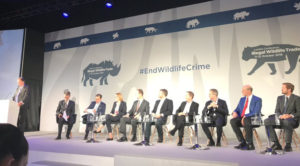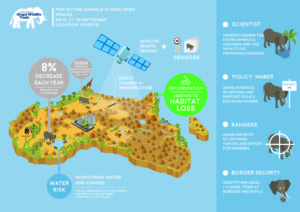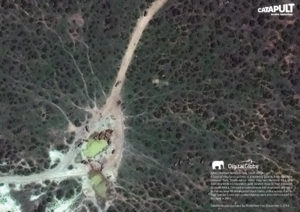Technology for Conservation
Marketing


Co-authors: Heather Garrick and Fernando Carballal
The Illegal Wildlife Trade (IWT) is the largest direct threat to the future of many of the world’s most threatened species. The world is dealing with an unprecedented spike in the illegal wildlife trade, threatening to overturn decades of conservation gains. In 2011, the 13 largest seizures of illegal ivory were estimated to collectively weigh more than 23 metric tons. This figure represents 2,500 elephants killed illegally by poachers. Poaching also threatens the last of our wild tigers, with numbers now estimated at just 3,890 worldwide.
The IWT Conference held in London by the Foreign and Commonwealth Office (FCO) brought together world leaders and organisations to discuss solutions, case studies and interventions that aid in the fight against IWT. In the lead up to the conference, the Satellite Applications Catapult partnered with the FCO, United for Wildlife and the Digital Catapult to co-host IWT technology events. The two day-long events brought together conservationists, academia and leading technology companies Google, Microsoft and Amazon Web Services to start to define the right tools needed to tackle IWT.

Innovative tools and technologies have an important role to play in assisting law enforcement to tackle IWT and the events highlighted gaps for technological interventions to enable this. Through the enforcement chain, tech solutions can support the following efforts: detecting poaching threats and monitoring vulnerable wildlife in remote areas, improving detection rates for trafficked goods at borders and detecting the sale of illegal wildlife products in online and offline markets, alongside supporting criminal investigation work once a seizure has been made.
The goal of the two workshops were to bring sectors together to mobilise their resources to share data, develop tools, and provide sustainable solutions for tackling IWT. Over the course of the workshops, it became clear that the technology sector is passionate and willing to engage in the fight against IWT. However, there is currently a lack of physical space and conservation resource to match-make the expert skills offered by technology companies with real world IWT problems.

Under the continuing threats of climate change, habitat loss and the illegal wildlife trade, the United for Wildlife community created Wildlabs, a community dedicated to sharing information of the use of technology. This has led to the proposal of Wildlabs TechHub, a 6-month programme that will provide a mechanism that enables conservationists and tech companies to work in partnership to deliver cost-effective and robust solutions to IWT challenges. The TechHub will aim to help “nearly there” solutions get over the line to implementation and with developing new solutions by applying existing technology to IWT problems.
The Satellite Applications Catapult has pledged to provide business and technical support to the Wildlabs TechHub programme with the goal to help identify barriers and solutions, develop business strategies and provide technical assistance with satellite technology to develop sustainable solutions in the fight against the Illegal Wildlife Trade.

If you are interested in finding out more about our support in tech for conservation please Fernando Carballal and Heather Garrick.